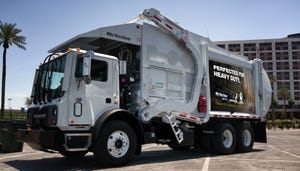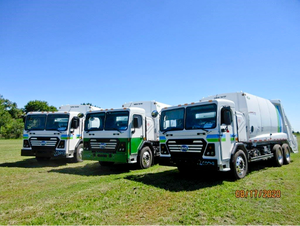recycling: Postal Pilot Delivers Junk Mail To Recyclers
April 1, 1997
Ryan Dougherty
Recently, the U.S. Postal Service, Washington, D.C., chose Atlanta to launch a new "junk" mail recycling program. If successful, the program will act as a model for other states, such as Florida and California.
First, the Postal Service awarded Southeast Paper Recycling of Atlanta (SPR) a five-year contract to collect and recycle the city's undeliverable mail - such as newsletters, advertisements and magazines - that, unlike first class mail, are not forwarded with an address change.
The Gwinnett and Hapeville post offices collect this mail from approximately 200 post offices throughout Atlanta.
Postal employees separate the mail into two categories - slicks and magazines or news, envelopes and fliers - and deposit the material into separate 40-yard compactors, provided by SPR.
Once full, SPR hauls the compactors back to its facility to inspect the loads' quality, leaving empty compactors in their place. When SPR determines that it meets mill specifications, the slicks and magazines are sent to Augusta Newsprint, Augusta, Ga., and recycled into newsprint, while envelopes and newsletters are sent to Fort Howard, Savannah, Ga., and recycled into tissues and towels.
So far, 788 tons (1.8 million pounds) of paper have been recycled. SPR expects this number to rise to approximately 72,000 tons this year. By multiplying the tipping fee and the tons projected, the company estimates that the postal service will save approximately $150,000 a year. In addition, SPR projects the program will save more than 100,000 trees a year.
One stumbling block, though, has been correct material separation, especially for new employees. "The Postal Service needs to work on educating their employees," said SPR spokesperson Eddie Fernandez. "Once everyone is up to speed, the program probably will continue for years without interruption." To this end, SPR hired Roger Ashe to train the postal employees, which is expected to take three to six months.
Nationwide, in 1996, the Postal Service delivered 183 billion pieces of mail. Of that, approximately 71 billion pieces (39 percent) was "junk" mail. Although postal officials don't have a specific breakdown for mail in Atlanta, they expect it to reflect the national pattern.
In addition to its junk mail efforts, the Postal Service recycles wastepaper, cardboard, plastics, cans and other material. In fact, recycling of these products generated approximately $6.6 million in revenue for the agency last year.
MINNEAPOLIS - New research conflicts with U.S. Environmental Protection Agency's conclusions that industrial non-hazardous waste landfills are adequately regulated.
Environmental Information (EI), Minneapolis, reported that in several states, landfill operators can avoid regulatory requirements, including covering liners, leachate collection and groundwater monitoring, through regulatory exclusions, grand fathering provisions and agency-granted variances.
Numerous states also have failed to impose financial assurance requirements on industrial non-hazardous waste landfill operators, creating the possibility of yet another publicly-funded cleanup program in the future, according to EI.
Even more disturbing is the report that few states require incoming shipments to be tested by these landfills to assure that neither hazardous wastes nor other, unapproved wastes are being delivered for disposal.
Twenty-four states, including California, Illinois, Michigan and Texas, could not even provide the number of industrial non-hazardous waste landfills operating within their borders.
While existing federal regulations prohibit these landfills from taking most hazardous waste, they still receive materials that contain toxic substances. And, under the Hazardous Waste Identification Rule, these landfills are likely to receive an even larger amount of contaminated wastes since the rule allows some RCRA hazardous wastes to be disposed of in non-hazardous waste facilities.
For more information, call (612) 831-2473 or contact EI customer service at (800) 593-6271.
Environmental Marketplace is the third in Environmental Information's series of environmental business reports designed for environmental business and policy specialists addressing the industrial nonhazardous waste sector. For more information, contact Environmental Information at (800) 593-6271.
You May Also Like


